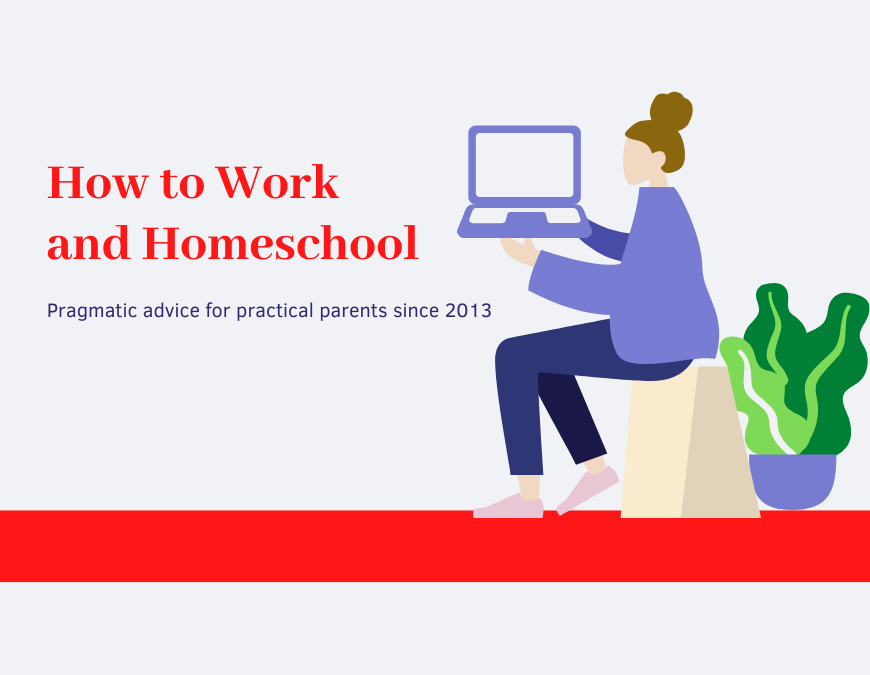Disclosure: This post contains affiliate links to Amazon.com.
Publication date: April 2013
With the academic year gearing up, I have received several questions about what sort of curricula we use in our homeschool setting. In the wake of my new book's release, I also get the question "What curricula work well for working parents?"
Today I will answer both questions with one post by summing up our personal experiences. Note that I also have two Pinterest boards, one for the 2012-2013 and 2013-2014 school year, that may be helpful, too. (I update them as we move forward through the year.)
Preschool & Kindergarten
When we began homeschooling during our child's preschool years, I gravitated naturally toward the child-led Reggio Emilia method. That approach worked brilliantly for us through most of first grade. In fact, even as we begin second grade, we continue to include RE methods, although now I refer to it as project-based homeschooling. It's a wonderful middle-ground between traditional, seated homeschool pedagogy and unschooling. It's also very compatible with working since children are taught to take initiative and let their passions drive them.
Reggio Emilia is still new here in the states. When I started out, I had to piece together how-to information from reading online and picking up books written for early childhood educators. Nowadays Lori Pickert's book Project-Based Homeschooling: Mentoring Self-Directed Learners is available, and it's an outstanding introduction to the concept. Lori demonstrates that the approach works well for older kids, too. I recommend her book constantly to my clients/workshop participants and in online forums.
For parents who need something more structured--or for parents with younger kids who want to "do school" with older siblings, June Oberlander's Slow and Steady Get Me Ready will work until the start of Kindergarten.
First & Second Grade
Now that our son is older, and although project-based learning remains at the core of our learning, I've come to embrace the idea that workbooks offer us a chance to practice executive function skills daily (see video below).
For example, our son "earns" computer time during the week by completing workbook material during two short "schoolwork sessions" daily. The overarching lesson in this work, for us, is that "we do our work first and play later" not "you will master every page in this book." (We do tend to skip around.) Moreover, I need prompts to integrate topics such as science and math into our day. Workbooks help.
We've experimented with different brands, but I have to say that we're both sold on the Spectrum curriculum materials by Carson-Dellosa. The text is clearly written and the pages are colorful without being cloying. I anticipate we will continue to use them through 8th grade. I've read where public school teachers have praised Spectrum for grabbing the attention of energetic, curious learners who bore easily. This doesn't surprise me one bit. (Homeschooling tip: Doing a portion of the workbook lessons orally helps keep the momentum up, especially for gifted kids with writing skills that lag; just be sure to leave ample time for handwriting practice daily. Spelling and math are good topics for this if you have a kid who is handwriting resistant.)
When it comes to history, I'm enormously picky and I have yet to find a packaged curriculum or guide that impresses me. We currently use two history encyclopedias from the UK (prepared by a team of scholars) and generally let project-based homeschooling guide our sequence of study. We also refer to the the popular What Your [Child] Needs to Know Core Knowledge series on occasion for reference.
Last year, we studied French and Spanish simultaneously. This year, we're dedicating a semester to each at our son's request. This will allow us to go into greater depth and (hopefully) move beyond simple vocabulary. First up is Spanish, for which we'll use Spanish for Children, a collection of CDs by McGraw Hill, and Side by Side Grammar. For texts, I like the small, blue Skill Builders Carson-Dellosa language books but--much as with history--I find that language workbooks for kids come up short, being little more than a repetition of vocabulary. (If you're interested in French, you can see a round up of my favorite affordable apps for the language here.)
We supplement with the Life of Fred series and Logic Links by Mindware for math. On the technology front, the Brain Pop and Brain Pop, Jr. apps are great on our iPad. I'm also loving the e-book Let's Play Math: How Homeschooling Families Can Learn Math Together and Enjoy It! as a means of helping integrate math into our lives more organically.
That's our curriculum round-up, which of course is subject to change as we move forward with the academic year.
Now I'd love to hear what works for you--especially if you have older kids--in comments or over on Facebook.
Looking for more great curriculum ideas? Be sure to check out Curriculum Week, part of the iHomeschool Network (Not) Back-to-School Blog Hop.


No comments:
Post a Comment
Got feedback? Great, let us hear from you in comments! (Moderated)